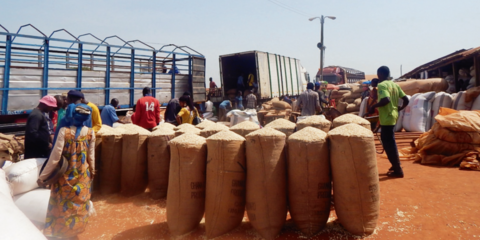
Agricultural Value Chains
This evaluation by DEval analysed how the promotion of agricultural value chains by German development cooperation has effects on poverty reduction and food security in the Global South. A close look was also taken at its effects on gender equity and environmental sustainability. The evaluation was completed in 2016.
The majority of extremely poor and chronically undernourished people live in rural areas. A large proportion of these are smallholder farmers, who often have no access to important means of production such as land, seeds and fertilisers, nor to financing. In most cases they also lack the opportunity to become better informed about important aspects such as sustainable production practices, entrepreneurial behaviour, markets and prices.
In order to integrate smallholder producers into national and international production and trade processes and to improve the living situations of the people involved, German and international development cooperation are increasingly emphasising the promotion of agricultural value chains. This means all stages in the production process of agricultural goods – from the provision of inputs and the production, harvesting, processing and distribution of crops to the consumption of the products.
Value chain promotion is intended to contribute to improving agricultural production and processing, with a view to increasing people's incomes and creating jobs. The overarching goal is to reduce poverty in the countries concerned and to improve the food situation.
Findings and Recommendations
- The promotion of agricultural value chains contributes substantially to improving the living conditions of people in rural areas.
-
However, the benefits of value chain promotion for chronically poor people are, at best, indirect. In order to reach these people, other development cooperation measures need to be put in place.
- How the measures work depends crucially on which product is promoted.
-
For instance, the promotion of staple foods for the domestic market has more direct effects on the availability of foods in local markets, and hence on the population’s food security, than the promotion of export crops. Therefore, the possibility of promoting staple foods should always be examined, especially in food-insecure regions.
- Value chains are very complex.
-
This harbours the risk of pursuing too many objectives at once, and not defining the target groups sufficiently clearly in the conception of the measures. A differentiated analysis beforehand can help with the explicit prioritisation of objectives and clear identification of target groups. Consequently, the promotion can be tailored with precision.
- Frequently the promotion does not reach women, since they often have poorer access to land and other resources.
-
Promotion measures, and in this context mainly advisory and financial services, should be conceived in such a way that they particularly support women’s access to value chains.
- Environmental aspects are not systematically considered in the conception of the measures.
-
The promotion should be more strongly oriented towards environmental sustainability in order to utilise the potential that exists for positive impacts while minimising the risk of negative impacts.
The evaluation was completed in 2016. This is a summary of the results and recommendations; you can find the complete results and recommendations in the report.
Background
Agriculture is the most important economic sector in many countries, especially in Africa, and is therefore considered key to economic development. At the same time, people in rural regions are disproportionately affected by poverty, which is often accompanied by temporary or chronic food insecurity. Many smallholder producers suffer from restricted access to production inputs such as land, seed and fertilisers as well as to financial services, advisory support and innovations. Their low level of competitiveness and inadequate integration into agricultural markets prevent them from taking sufficient advantage of the great potential that exists for broad-scale growth and food security.
The promotion of agricultural value chains responds to these challenges by supporting the competitiveness of smallholder producers and promoting processing and trade in order to create jobs and increase value creation in the country.
Methods
The evaluation was started by conducting an analysis of the German portfolio of projects and programmes for agricultural value chain promotion. This involved distinguishing between different promotion approaches and activities and, on the basis of certain central fields of action, identifying an overarching theory of change.
In the course of expert interviews, further information was obtained on the nature of the causal pathways and on relevant contextual conditions. Case studies were then carried out in Burkina Faso and Ghana, focusing on four different value chains (pineapple and maize in Ghana, cashew and rice in Burkina Faso). Making use of these, a structured comparison could be performed to check the effects on the target group level as well as the causal pathways and relevant contextual conditions. The aim of this was not just to answer the question of "whether" a measure had worked but also "how" and "why" it had worked. The causal mechanisms leading to changes that were observed were surveyed and analysed with the aid of a realist evaluation approach. An analysis of documentation and literature accompanied the approach.
Team
- Dr Marcus Kaplan Former Senior Evaluator DEval
- Simon Bettighofer Former Evaluator DEval
- Dr Sabine Brüntrup-Seidemann Former Evaluator - Team Leader
- Dr Martin Noltze Senior Evaluator - Team Leader
Contact
Dr Martin Bruder
Phone: +49 (0)228 336907-970
E-mail: martin.bruder@DEval.org
